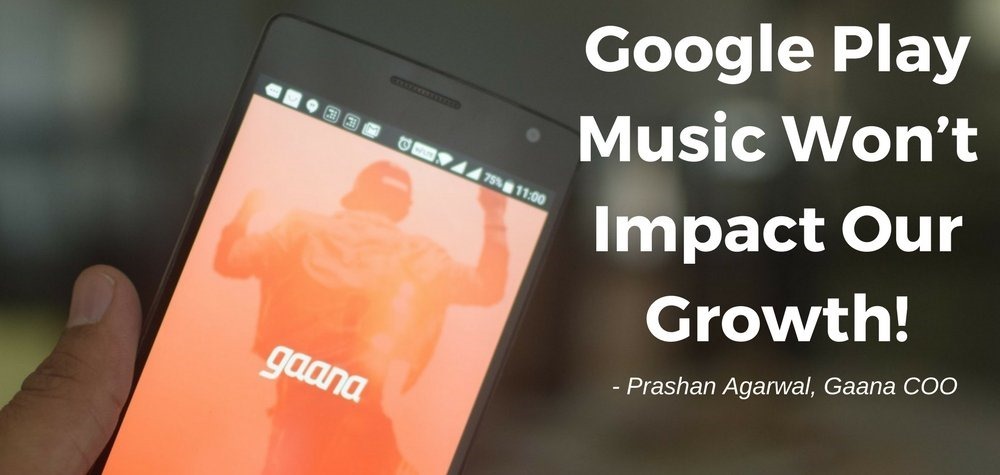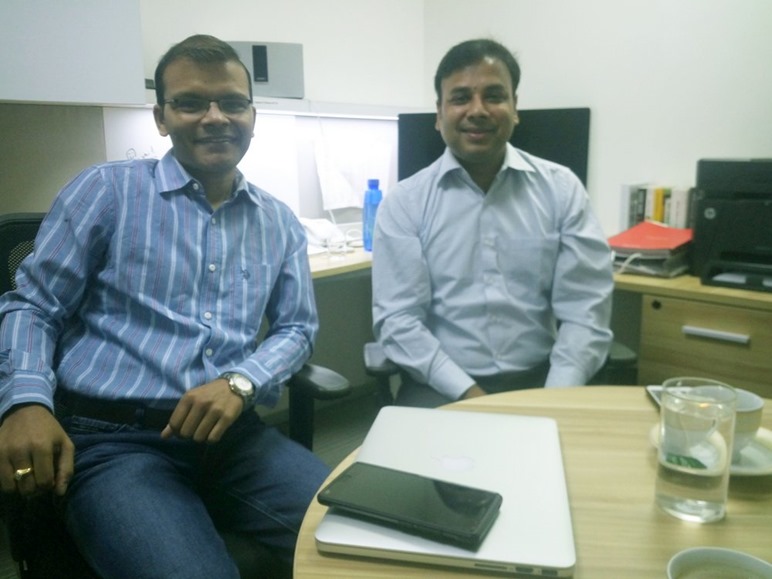Google Play Music’s Presence Won’t Impact Our Growth: Gaana.com COO

Online streaming is revolutionising music consumption habit in India. In fact, such is the impact that the very definition of music is undergoing a massive change. Close to 100 million Indians are right now listening to music via websites and apps, buffering tons of data every second.
The way ‘Netflix and Chill’ has now become a popular term in the US, very soon a similar term would invade India, and redefine the activity.
As per a report in 2016, online music streaming is right now third most popular activity on the Internet after email and social media, as 63% of all Indian urban Internet users are hooked on to online music streaming service in the country. Overall, it is a Rs 3100 crore market, and expanding at an incredible pace.
With 70+ million downloads, Gaana is India’s #1 online music app, even as other established players such as Saavn, Wynk, Hungama, Apple Music, Raaga are ramping up efforts to capture the market.
However, the entry of subscription-based Google Play Music early this month created a buzz in the industry. Music fans all over the country are now spoilt for choices, as this is for the first time that Google has entered into on-demand entertainment niche in India, that too with an introductory subscription plan which is marginally cheaper than Gaana.
We decided to find out the ground realities, and examine how different players in this segment are planning to tap the massive Indian market.
And, find out how Google’s entry will change the equations for the industry.
In the same endeavour, a few days back, we spoke with Gaana.com’s COO, Prashan Agarwal, along with Product Head Rohit Raghav in an exclusive interview. We had an interesting conversation, pertaining to Gaana.com’s future plans, their strategy to tap music talent, their product updates, and most importantly, their reaction to Google Play Music’s entry in India.

Here is a summary of our question and answer session, featuring the major highlights:
Contents
Question: Google Play Music in India & Impact on Gaana.com
Response: Prashan Agarwal has categorically denied any impact on their growth, due to Google Play Music’s entry in India. As per him, Google has launched a subscription-based model for listening to online music, a model which is still nascent in India. On the other hand, Gaana.com offer both free streaming of music along with advertisements and paid subscription which offers an ad-free experience with more value additions.
He said“India is a vast market as of now, and there is room for everyone to grow and prosper. Gaana.com has been on the market for quite some time, and they have a vast amount of information on the way Indians consume music, something which Google doesn’t have. Gaana’s 34 million active users are accessing more than 30 million songs, listening to 1 billion music streams and accessing music in 30 Indian languages. Gaana is clearly ahead of their competitors.“
He added, “India is not a subscription market as of today, and we don’t see any impact due to Google Play Music or Apple Music in India, as of now.”
Question: But Google Play Music is also offering Cloud Storage for storing music
Response: As per Prashan and Rohit, such cloud storage of music on Google Play Music app is a feature which will be hardly used in India. Besides, it might lead to piracy. Local curation of music is almost extinct in India, as people are preferring online curation of music, and listening to online streaming. Google’s cloud storage of music might be more prevalent for those users who are downloading pirated music from torrents.
They actually requested all ISPs in India to work towards stopping piracy of music in India, something which they have done abroad, but not in India. Due to this, 70% of Americans are listening to curated music from apps and websites. If Google completely scraps all pirated sources of music from their search results, online streaming of music will take off like anything. It’s a win-win situation for all the players.
Question: So, subscription-based monetization is not for India? Gaana is also offering a subscription to generate revenue…
Response: India is right now at a market penetration stage, and it will around 5 years for the market to fully mature and accept a subscription-based monetization model. Hence, advertisements and subscription are two monetization models currently being used by Gaana. If compared, then subscription has low single digit penetration as of now.
In China today, more than 600 million users are listening to online music, and around 6% of them pay for that service. India has still a long way to go.
Question: What Are Gaana’s Future Plans?
Response: Right now, Gaana is working on advanced machine learning algorithms, which will make selection and curation of songs more accurate, and more inclined towards user behaviour. For instance, say a person is listening to song A. Based on Artificial intelligence readings, Gaana’s algorithm will determine that songs B, C and D are similar to A, hence, would recommend to that user.
Another example: user to user songs matching. For instance, say a person called X is listening to songs A, B and C; whereas person Y is listening to songs D, E and F. Now, if X and Y are connected via social media, then Gaana will recommend songs D, E and F to X and songs A, B and C to Y. Songs matching, based on social connections, and understood by deep machine learning.
These are the features which would be soon available to Gaana’s users in the coming days.
Right now, Gaana is already using Editor’s Pick, which recommends songs based on the timing of the day and the overall emotional sentiments of the day. For example, devotional songs during the morning, romantic melodies during the evening and so on.
As per Rohit, song intelligence, combined with artificial intelligence and machine learning is what Gaana is using to understand their audience and provide them with the songs which they like listen. Exciting times for Gaana users ahead.
Question: What about exclusive content from Gaana, something along the lines of Amazon Prime, Netflix and Hotstar?
Response: As of now, Gaana is partnering with labels to scoop out exclusive songs from artists, rather than signing artists for the same. Gaana aims to become India’s #1 online distribution channel, rather than a private label. In terms of exclusive content, Gaana’s current shows are a super hit, which includes Aashish Vidyarthi’s Kahaanibaaz; The Asha Verdict by Asha Bhonsle, where she reviews songs and albums; The Unheard with Shankar Mahadevan, where he brings out unheard and hidden gems of music.
Periodically, Gaana is signing up exclusive songs from superstars as well, which are actually providing more value to the users. For instance, Punjabi superstar Diljit Dosanjh’s exclusive song Laembadgini, which generated close to 1.2 crore playouts. Recently, Gaana partnered with the cricketing legend Sachin Tendulkar for his first song ever.
Question: How Is Gaana supporting indie artists? Which genres are you expanding?
Response: Gaana is developing a platform, which will help and support indie artists to come up and give their best. By convincing legends such as Asha Bhosle and others to review songs, Gaana is creating that platform which will allow indie artists to make that a big bang launch. In terms of genres, Gaana is making some solid headways into comedy, with shows like Hansi ke Phuware, Mirchi Murga and more. They are roping in comedy superstars like Ehsaan Qureshi, Sunil Pal and others. In the coming days, Gaana will venture into crime, thriller, storytelling and other genres.
Next year, Gaana is planning to roll out 12 exclusive singles as well.
If you are a Gaana.com user and want to share a feedback or any opinion, then do comment right here!

Anyone studied impace of Jio Music. Seriously good collection. plus capacity to download and listen offline. Plus the content is completely free for the 303 plan users.